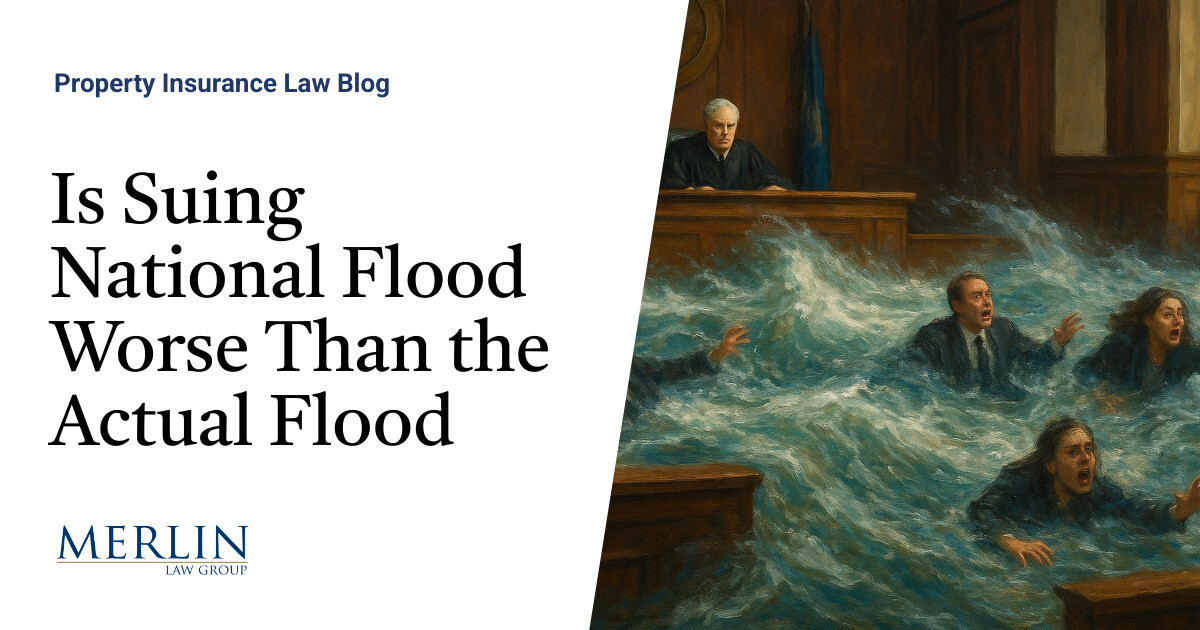4 instances throughout the final couple of weeks reveal that almost all policyholders suing Nationwide Flood will doubtless lose on technical proof of loss or statute of limitations causes somewhat than on the substance of the dispute. In Glass v. American Strategic, 1 the owners discovered that the one-year clock to sue began with the very first partial denial letter they acquired, not when the insurer despatched a later and extra formal rejection. The court docket had no persistence for the argument that subsequent letters in some way reset the deadline. The outcome? Time-barred and dismissed.
The Ghias, of their case in opposition to American Bankers, didn’t fare any higher. They argued that the denial letter was not primarily based on a sworn proof of loss and that FEMA bulletins about Hurricane Ian claims in some way required a unique consequence. The court docket disagreed, declaring {that a} denial is a denial, no matter whether or not a proof of loss was within the file, and the bulletins concerning the adjusting process don’t save a lawsuit filed too late. 2 They, too, had been proven the door on statute of limitations grounds.
The Lees tried a unique tack, submitting a proof of loss for extra damages greater than a yr after Hurricane Ian. Their insurer stated it was too late, and the court docket agreed. 3 Efforts to say waiver or estoppel in opposition to the government-backed Nationwide Flood Program ran right into a wall of precedent. Courts have constantly held that except FEMA itself points a written waiver, the foundations are ironclad. The Lees’ case drowned beneath the load of strict compliance.
Lastly, the Agostinos managed to maintain their case alive a bit of longer in opposition to Monarch Nationwide. The insurer argued the case was late, nevertheless it relied on an affidavit outdoors the pleadings on the movement to dismiss stage. The court docket refused to go alongside, saying it couldn’t resolve timeliness from the face of the grievance alone. Nonetheless, the Agostinos misplaced their requests for lawyer’s charges and a jury trial as a result of NFIP instances don’t permit both. 4 In different phrases, they’re nonetheless within the sport, however the playbook is restricted. My view is that the Agostinos’ declare has an enormous gap that may sink their potential to gather something.
Taken collectively, these instances present that the flood in court docket is commonly extra treacherous than the flood in your house. Policyholders and their advocates want to grasp that the NFIP is a creature of federal legislation, not frequent sense or fairness. Miss a deadline, and the courts won’t forgive you. File late proof of loss paperwork, and you’re sunk. Count on the standard treatments of lawyer’s charges or jury sympathy, and you’ll be sorely upset.
The lesson is straightforward with regards to Nationwide Flood claims. Deal with each denial letter as if it had been a ticking clock, and get your proof of loss correctly accomplished and filed on time, as a result of the water within the courtroom rises even quicker than the storm surge.
Thought For The Day
“The one factor worse than being on a sinking ship is being on one with family members.”
—P.G. Wodehouse
1 Glass v. American Strategic Ins. Corp., No. 2:25-cv-443, 2025 WL 2676077 (M.D. Fla. Sept. 18, 2025).
2 Ghai v. American Bankers Ins. Co. of Florida, No. 2:24-cv-567, 2025 WL 2676373 (M.D. Fla. Sept. 18, 2025).
3 Lee v. Wright Nationwide Flood Ins. Co., No. 2:24-cv-216, 2025 WL Sept. 18, 2025).
4 Agostino v. Monarch Nationwide Ins. Co., 2:24-cv-957, 2025 WL 2770856 (M.D. Fla. Sept. 26, 2025).

